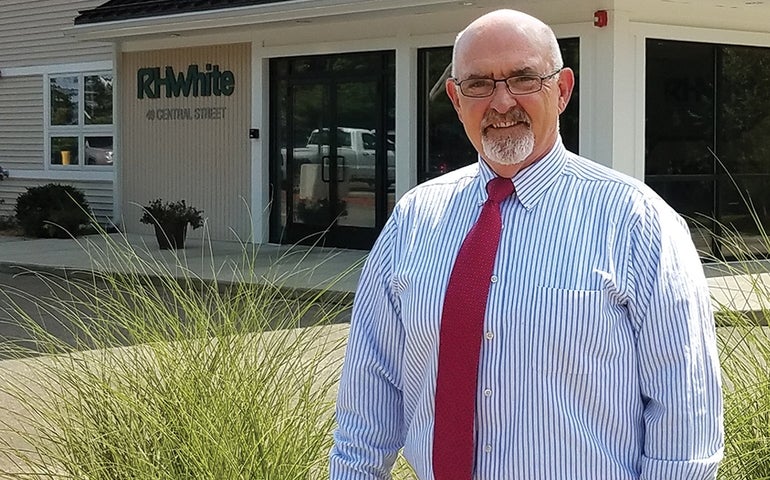On May 1, Chief Operating Officer James McCarthy took over as president and CEO of construction firm R.H. White Cos., replacing David White and becoming the first non-member of the White family to lead the company. He has worked at R.H. White for 34 years, joining the firm just as he was leaving the U.S. Army.
What does a combat engineer do?
A combat engineer destroys obstacles so troops can advance and puts in obstacles to keep the enemy from advancing.
Did those skills translate to R.H. White?
This was my first civilian job after getting out of the Army. I was stationed at Fort Devens, and I was looking for a place to challenge me professionally. I started here as a project manager, which is more building stuff than destroying obstacles. The military training did help, though, since we did do construction work in the Army.
I equated it to the military because construction is very much a team sport. Both involve getting to know and take care of your people. You need skills to make good decisions, have solid organization and pick the right people to accomplish what you need to do. The military gave me decisiveness, too.
What’s the main difference between COO & CEO?
The COO is more on the ground, inward focused. With the CEO position, I’m keeping one foot in the now and then really preparing the organization for the next transition in the future. It is a little more strategic, and you need to have a better understanding of the world around us and how we fit into that.
How has the transition gone?
The transition has been very good. It has gone very smoothly. We are trying to prepare for the next evolution of our company, and David needs to focus on the next system of governance for the next generation of our company.
We need to figure out how to move from an organization where one person makes all the decisions to being agile enough to respond to the changes of the future, without being bureaucratic.
What does that involve?
Ultimately, there is a fourth generation of the White family working here. We need to understand what will be the governance required of that fourth generation, because gone are the days when you have a lifetime to learn. We’ve got to respond to be successful in a business environment. That will require a more diverse, process-driven decision-making structure.
We’ve got ownership that wants us to succeed for the next 96 years. That sets the course for the strategy. We aren’t going to set up a portfolio of business just to market the company to sell. We want to be sustainable to keep R.H. White around for a long time.
What might the future governance be?
Even though the company was privately held, it has always relied on its board of directors for advice. Perhaps as we move toward the fourth generation, that board of directors or governance system may be more directly involved in the decision making.
What projects do you primarily do?
The type of projects has been more about taking care of the customers’ needs, more than just seeing them as a commodity.
We work in the public sector, and we have a large private customer base in Central Mass., with firms like Waters Corp., Hanover Insurance Group, Saint Gobain and Wyman Gordon. As those customers grow, we are there to support their projects. A large portion of our business is repeat business.
How do you keep them repeating?
Customers in the private sector primarily come to us for one of three reasons: 1) They are frustrated with dealing with multiple parties to get things done; 2) They are worried about getting a recommendation not thoroughly analyzed; 3) They are worried about people working at their facility or on their campus who might impact their core business.
We do well when we get into a facility where we don’t impact the customer’s core business. If they have to change a manufacturing line while keeping the business running, we have to understand what they are trying to do. If they are replacing a cafeteria, we need to understand how to keep the existing cafeteria open for as long as possible, so as not to impact the employees.
This interview was conducted and edited for length and clarity by Brad Kane, WBJ editor.

